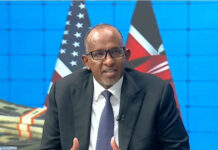Health Cabinet Secretary Aden Duale on Tuesday appeared before the National Assembly Health Committee to respond to questions over how funds under the Social Health Authority (SHA) have been used since the agency’s formation.
The session, chaired by Seme MP Dr James Nyikal, examined findings from a recent parliamentary report that assessed the performance and challenges of SHA, particularly how the authority has managed payments to health facilities and its progress on implementing Universal Health Coverage (UHC).
During the meeting, the committee raised six key areas of concern including delayed payments to hospitals, data and registration errors, inclusion of vulnerable groups, financing of premiums, weak ICT systems, and unequal reimbursement for ambulance and referral services.
In his response, Duale assured MPs that the government was addressing these issues. He noted that SHA had made progress in speeding up claim settlements through better verification systems and continuous sensitisation of healthcare providers.
“We are streamlining provider onboarding, improving data accuracy, and ensuring that no Kenyan is denied care under Universal Health Coverage,” Duale said.
To support vulnerable Kenyans, the CS revealed that SHA has introduced a flat-rate premium of KSh 660 per monthfor every indigent person identified in partnership with the Ministry of Social Protection. He urged development partners and well-wishers to help sustain the initiative.
Duale also highlighted efforts by the Digital Health Agency (DHA) to work with the National Registration Bureau and biometric service providers to improve system reliability. These changes, he said, will eliminate frequent ICT disruptions that have frustrated health workers and patients particularly older citizens.
On ambulance and referral services, Duale said a Joint Technical Committee had been formed to develop a framework for an “ambulance evacuation benefit package.” The team brings together officials from the Ministry of Health, SHA, the Council of Governors, DHA, Emergency Medical Kenya Foundation, Safaricom, and the Kenya Medical Practitioners and Dentists Council.
The committee’s report, based on visits to several hospitals across the country, had flagged gaps in coordination, governance, and technology all of which have affected the rollout of UHC.
Citing Article 47 of the Constitution, which guarantees fair and efficient public service delivery, Duale requested more time to present detailed responses to the issues raised by MPs.
Both the Ministry and the committee agreed to form joint technical working groups to review the report and recommend practical solutions.
“Our shared goal is simple to make Universal Health Coverage work for every Kenyan,” Duale told the committee.
The CS was accompanied by senior officials, including Dr Ouma Oluga, Principal Secretary for Medical Services; Dr Mercy Mwangangi from SHA; Dr David Kariuki from KMPDC; Eng Anthony Lenayara from DHA; and Mombasa Governor Abdulswamad Nassir, who chairs the Council of Governors Health Committee.










